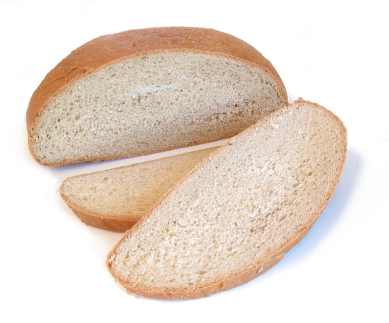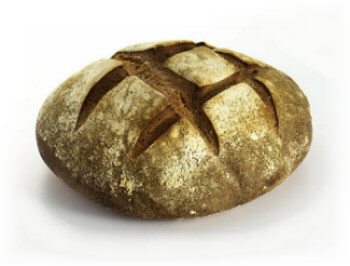
Jay Michaelson
In both the mystical and non-mystical models, there is a move away from concrete reality toward an alleged deeper reality, or a conceptual map. And to me, this pull away from the materiality of bread toward either the myth (Christian) or the law (Jewish) or the symbolism (Kabbalistic) of bread seems like a pull away from God Itself. If I wash my hands with the right amount of water, make that blessing, then silently return to the bread, and make the blessing then, and then eat the bread without much consciousness, I have, indeed, contextualized the bread into a system of holy, legal signification. But have I made proper use of the world which God has created? Have I appreciated the body, the bread, and the miracle of eating? Or have I, in the name of following a Divine precept, actually moved away from the Divinity inherent in the fresh baked bread?
I've heard halacha described, by at least one rabbi interested in syncretizing it with the nondual, integral philosophy of Ken Wilber and others, as the true nondual path. It is a return to the world, an acceptance that the One exists, and a return to the Many as a manifestation of the One. Notice that there are at least three stages in this progression. First, there is holiness in nature -- this is the stage of paganism, which sees the sacred everywhere. Second, there is the holiness beyond nature, the one God which unifies all -- this is the stage of monotheism, of salvation, and of the attainment of Nirvana as an escape from the wheel of Samsara. But then there is the path of unification, of seeing the downward-pointing triangle of the Jewish star (i.e. this world) and the upward-pointing triangle (i.e. God) as being the same. Thus we return to the world neither denying the holiness of the manifest nor denying the sacredness of the hidden.

In theory.
In practice, I have come to hold great doubts about the way halacha engenders the appreciation, delight, awe, and wonder that is a precondition for an individual's authentic spiritual evolution. Indeed, in much of traditional Jewish practice, there is a fear of enjoying the bread too much, lest we lose sight of its central significance, which is legal. (I'm reminded of the Church authorities who tried to stop Gregorian chant because its beauty was distracting people from the texts being sung.) And in the Kabbalistic model, there are all kinds of spooky suppositions that need to be accepted before the symbolic bread has any meaning deeper than a vague spiritual feeling. Sometimes the web of signification enhances the experience of eating bread, but sometimes it deadens it.
And of course this isn't just about bread. The more dangerous "breads" of art, music, sensual pleasure -- even beauty itself -- these are feared, banned, marginalized, and mythologized into cosmic forces of evil. Obviously, it's only the fundamentalists who reject beauty. But the pull is there even in the mainstream, away from the act of fasting to the "reason why we fast," away from the simple beauty of candlelight to the "reason why we light candles." It's like we're looking for a text to link this act to God, when God is right here in the beauty of the act itself.
Finally, halacha, and religious signification more generally, can create attachments to a particular bread, land, and tribe. What's liberating about "Fresh Baked Bread" instead of "This is My Body" is that it doesn't depend on a particular myth. It's the opposite of what I called, last month, "fetishizing the trigger" because its trigger is not Christ, or Gaza, or a kezayit of challah, but any bread, any breeze, any moment. Any trigger will do -- and indeed, the point of meditation practice is gradually to expand the boundaries of what "will do," including times and places which may be very unpleasant, or even awful. Of course, it doesn't happen automatically; practice takes practice. But it can happen. That, for me, is the goal: to live so richly that every crumb of bread has the importance of communion.
 It seems like every contemplative tradition eventually translates itself into a similar kind of religion. Buddhism as practiced in Asia has very little to do with paying attention to bread, and very much to do with fixed ritual, symbolic omens, offerings at shrines, praying to bodhisattvas, and acquiring merit through particularly defined acts. And the contemplative Judaism of a few elites -- whether it's Maimonides' philosophical ecstasy, the Kabbalists' pan-symbolization of the world, or the Hasidim's pantheism -- inevitably gets turned into dogma, magic, and code. Likewise in countless other traditions which begin with a mystic in the wilderness and end with fundamentalists enforcing dogma with violence. It's like we make the same mistake, over and over again, around the world, as we try to translate a disruptive and individualistic practice (transforming experience, grounding ethics in wonder, etc.) into a system which maintains the status quo, binds together a community of householders, and offers a little bit of God's mojo to people without the luxury, taste, or karma for mystical practice. Perhaps it's the necessary mistake of religion.
It seems like every contemplative tradition eventually translates itself into a similar kind of religion. Buddhism as practiced in Asia has very little to do with paying attention to bread, and very much to do with fixed ritual, symbolic omens, offerings at shrines, praying to bodhisattvas, and acquiring merit through particularly defined acts. And the contemplative Judaism of a few elites -- whether it's Maimonides' philosophical ecstasy, the Kabbalists' pan-symbolization of the world, or the Hasidim's pantheism -- inevitably gets turned into dogma, magic, and code. Likewise in countless other traditions which begin with a mystic in the wilderness and end with fundamentalists enforcing dogma with violence. It's like we make the same mistake, over and over again, around the world, as we try to translate a disruptive and individualistic practice (transforming experience, grounding ethics in wonder, etc.) into a system which maintains the status quo, binds together a community of householders, and offers a little bit of God's mojo to people without the luxury, taste, or karma for mystical practice. Perhaps it's the necessary mistake of religion.
Some would say that this "mistake" is the only thing keeping us from fascism. Once we start exciting the passions, they claim, the zealotry of the hilltop youth (who are mostly spiritual, guitar-playing "hippies") is inevitable. But that's only true if a certain hilltop matters. If fresh baked bread is just bread -- not this specific God-given magic -- then, it seems to me, it's nonsensical to fight over which finger better points at the moon, or where one has to stand to see it. One needn't choose between fundamentalist spirituality, disembodied mythical religion, and desacralized humanism, because the simplest, and most obvious, realities of our experience are also the ways beyond myths of God to realities of God, and the ways away from concepts and back to reality.
That's the kicker: that fresh baked bread, with no ornamentation, is simultaneously the deepest mystical path and the simplest material one. It's where the "here and now" of the contemplative meets the here and now of the Epicurian, leaving dogmatists with their dusty books and stories. It's so simple -- if we can just clear the cobwebs out of the way and enjoy it.
October, 2005
Making peace with Jesus
Freedom and the Ordinary
Notes from and after retreat
Between contemplation and affirmation
March, 2003
June, 2004
July, 2005
July, 2005
July, 2005
June, 2005
April, 2005
March, 2005
On the anthropology of contemplative practice
February, 2005
November, 2004
Walking through The Gates
March, 2005
Eternal Sunshine: The Ultimate Passover Movie
April, 2004
April, 2004
February, 2004
January, 2004



The Jerusalem Same-Sex Attraction Group
Phil S. Stein
The Second Coming of Yeshayahu Leibowitz
Avi Steinberg
An Account of the Saltscape
Joshua Cohen
Fresh Baked Bread
Jay Michaelson
Out of the Depths
Lorna Knowles Blake
Lore
Adam Lavitt
Archive
Our 790 Back Pages
Zeek in Print
Fall 2005 issue out now!
About Zeek
Mailing List
Contact Us
Subscribe
Tech Support
Links
From previous issues:
Ochila LaEil
The So-Called Jewish Cultural Revolution
With a Bible and a Gun
Hayes Biggs
Leah Koenig
Samuel Hayim Brody

 Email us your comments
Email us your comments